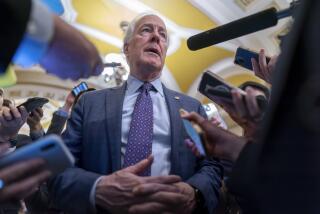Moderation is the Mantra for Democratic Senate Candidates : Georgia race typifies dynamic across U.S. as Max Cleland stakes out ‘sensible center.’
- Share via
ATLANTA — “There was a time I could have given up and let Uncle Sam take care of me,” Democratic Senate candidate Max Cleland says in a campaign ad here in Georgia.
As Cleland--who lost both legs and his right arm in a Vietnam War grenade blast--gets into his car and hauls his wheelchair after him, he adds a thought usually heard from Republicans: “But I was raised to believe you can’t expect help--if you don’t help yourself.”
The vignette artfully exploits the two major factors giving Cleland an early lead in the race to fill the seat being vacated by veteran Democrat Sam Nunn--his triumph over personal disaster and, of far broader significance, his commitment to what he calls “the sensible center” of U.S. politics, a phrase he acknowledges he borrowed from retired Gen. Colin L. Powell.
This celebration of moderation, in Georgia and across the country, is the key to mounting optimism among Democrats about the party’s prospects in next month’s Senate contests. It is the credo that many Democratic Senate candidates are using to separate themselves from their party’s liberal past while also hoping to take advantage of negative reaction to what they call the “extremism” of the GOP-controlled Congress.
With GOP presidential candidate Bob Dole trailing President Clinton by substantial margins in most polls, the 34 Senate contests have taken on greater than usual significance. Leaders in both parties agree that the GOP’s ability to maintain its three-seat dominance of the Senate will go a long way toward determining the shape of Clinton’s second term, if he holds his lead, or the first-term fortunes of Dole, should he stage a dramatic comeback.
Not so many months ago, the Democrats’ Senate prospects looked bleak indeed. With the conservative GOP tide running strongly in the wake of the 1994 vote, Democrats were faced with the daunting task of replacing no fewer than eight of their party’s retiring incumbents, four of them in the Republican stronghold of the South.
But now Democrats are talking of gaining ground on the Republican Senate majority and perhaps even taking control. These hopes have been spurred by the results of primaries in five states, Georgia among them, where GOP voters picked Senate candidates more conservative than their rivals and thus far more vulnerable to attack by their Democratic foes.
Nebraska Sen. Bob Kerrey, chairman of the Democratic Senate Campaign Committee, argues that while his party is now focused on such concerns as “patriotism and family values,” Republicans are turning toward candidates who are out of step with most voters. Noting that a number of GOP Senate candidates oppose abortion rights, he said: “I think to make abortion illegal is outside the mainstream.”
“That’s nonsense,” snapped Kerrey’s GOP counterpart, Sen. Alfonse M. D’Amato of New York. “The Democrats are trying to drag some kind of red herrings into this thing. All they do is live and die bringing up the question of abortion.”
Nevertheless, abortion was one of the issues that contributed to sharp divisions among Republican primary voters in the five states--Kansas, Wyoming, Colorado, Illinois and Georgia--where antiabortion conservatives triumphed over moderates who supported abortion rights in the GOP contests, lifting Democrats’ hopes for victory in the fall contests.
To be sure, Democrats seem to be swimming upstream against demography and history in some of these states. In Wyoming, the battle to replace retiring GOP stalwart Alan K. Simpson pits Republican state Sen. Mike Enzi against Democrat Kathy Karpan, the state’s former secretary of state. Wyoming last elected a Democrat to the Senate in 1970. In Kansas, the fight is between Republican Rep. Sam Brownback and Democrat Jill Docking, a stockbroker, for the seat that had been held by Dole. Kansas has not sent a Democrat to the Senate since 1932.
But in two other states, the contests are being fought on more level ground, and both could go down to the wire.
In Colorado, Democratic attorney Tom Strickland is running against Republican Rep. Wayne Allard for the seat now held by Republican Sen. Hank Brown, who is retiring. And in Illinois, Democratic Rep. Richard J. Durbin is vying with Republican state Rep. Al Salvi for the seat Democrat Paul Simon is giving up.
The Georgia race between Cleland, 54, and multimillionaire Republican businessman Guy Millner, 60, for Nunn’s seat is similarly tight.
Cleland brings to the race an icon-like status in the state. Returning from Vietnam with the Bronze and Silver stars, he rebounded from his wounds to win election to the state Senate in 1970 at age 28, becoming its youngest member. He moved to Washington in 1977, when fellow Georgian and newly elected President Carter named him to head the Veterans Administration.
In 1982, Cleland was elected as Georgia’s secretary of state, holding the office for 12 years.
Millner is publicly prodding Cleland to face him in more debates than the one encounter to which Cleland has agreed.
A self-assured, self-made success in the business world, where he founded his own temporary employment firm and built it into a billion-dollar-a-year enterprise, Millner warmed up for his Senate bid by running for governor in 1994. He came within 2 percentage points of upsetting Zell Miller, the Democratic incumbent.
Since then, Millner has acquired experience and polish on the campaign trail. Spotting a Cleland aide at a recent Kiwanis luncheon in Suwanee, Ga., Millner instructed him to go tell his boss: “If you are not willing to debate your opponent, you are hardly qualified to serve on the floor of the U.S. Senate.”
“Millner doesn’t really want the debates for a forum,” said Cleland’s campaign manager, Tim Phillips. “He wants to interfere with our ability to raise money by keeping us tied up.”
Millner is spotlighting the contrast between his business background and Cleland’s years in public office. “There are too many career politicians in Washington already,” he said.
Explaining his strategy, he added: “You define yourself and you define [Cleland]. You make sure that people know he’s a liberal Democrat, that he campaigned for Teddy Kennedy in 1994. That doesn’t play very well in Georgia.”
Cleland can’t undo his campaigning on behalf of Massachusetts Sen. Edward M. Kennedy’s reelection; he has known Kennedy since his days as VA chief. But he has tried to distance himself from Clinton, another Democrat viewed as excessively liberal by many Georgians.
Cleland last month claimed disagreement with Clinton’s 1993 budget with a tax increase, his proposal to allow gays to serve in the military and “his attempted takeover of the health care system.” Cleland previously had been silent on these issues.
Pausing on his way to a meeting with citizens who are working with police to fight crime in Athens, Ga., Cleland sought to minimize the significance of ideological labels.
“I think the terms ‘moderate,’ ‘conservative’ and ‘liberal’ don’t mean much anymore,” he said. “The real division in American politics today is between the sensible center and radical right. And that is what you have here in this election.”
The sensible center, as Cleland defines it, is “a feeling about issues that goes along these lines: fiscally conservative with a social conscience, and I would add pro-choice. And I think the candidates who are going to win this November are the candidates who are in the sensible center, regardless of whether they are Democratic or Republican.”
More to Read
Get the L.A. Times Politics newsletter
Deeply reported insights into legislation, politics and policy from Sacramento, Washington and beyond. In your inbox twice per week.
You may occasionally receive promotional content from the Los Angeles Times.










